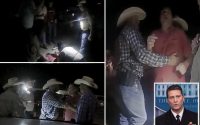Hunter Biden’s lawyers blamed by feds for failed plea deal
Federal prosecutors Tuesday blasted lawyers for Hunter Biden over their claims about the plea agreement that broke down last month — and reaffirmed their authority to withdraw the case, court filings show.
The office of Delaware US Attorney David Weiss said Hunter lawyer Chris Clark “inaccurately” claimed in a late Sunday filing that prosecutors had reneged on an agreement that would have granted the first son immunity from outstanding criminal probes.
The alleged reneging led Hunter and his lawyers to void the deal and have him plead not guilty at his July 26 hearing.
Hunter’s camp claimed it thought the deal granted him probation for a diversion agreement that included immunity for past crimes, but Special Assistant US Attorney Leo Wise scoffed at the notion.
He also dismissed arguments from Hunter’s legal team that the diversion agreement was already “in effect” and “binding,” saying the defense had merely “cobbled together snippets” from the court proceeding.

US District Judge Maryellen Noreika, at the July 26 hearing, had asked Clark and Hunter whether the guilty plea was conditioned upon “promises” — such as the immunity provision — made in the diversion agreement, which both acknowledged.
But such “promises” would violate federal guidelines for criminal court proceedings, Wise pointed out, though he had also signed onto the diversion agreement, filings show.
The prosecutor blamed Clark and Hunter for not abiding by the guidelines and called the plea deal’s implosion “a problem entirely of their own making,” noting that Noreika never signed it.

Delaware Chief US Probation Officer Margaret Bray also never signed or approved the diversion agreement, making it non-binding, Wise said.
Noerika had pushed Wise to state in court that future charges were possible as part of an “ongoing” investigation by Weiss’ office into the first son’s alleged financial crimes, prompting Clark to reject the deal.
Talks further broke down after the hearing as the parties failed to reach an agreement about a revised plea deal.
“Seeing that the parties were at an impasse, the Government informed the Defendant, in writing on August 9, 2023, that it was withdrawing the most recent version of its proposed plea and diversion agreements,” Wise added.

He disputed that Weiss’ office had “proposed and largely dictated” the terms of the plea deal, which Clark claimed in his Sunday filing.
Federal prosecutors said in an earlier filing that the case was now likely to go to trial.
Clark departed Hunter’s legal team Tuesday, the day after high-profile attorney Abbe Lowell, who has represented the first son in separate paternity and defamation cases, joined the defense.
Lowell in a Sunday interview said Weiss’s office had never discussed potential Foreign Agent Registration Act charges being brought against his client until the July court hearing — a fact Noerika drew out during the proceedings.

If their motion is approved, prosecutors could bring related new charges against Hunter in Washington, DC, and Southern California, too where Weiss had been previously blocked from bringing charges against Hunter, according to IRS agents on the case.
IRS supervisory agent Gary Shapley and IRS special Joseph Ziegler testified to Congress in recent months that US Attorneys Matthew Graves and E. Martin Estrada declined to partner with Weiss, effectively dooming the five-year investigation.
President Biden appointed the DC and California prosecutors in 2021 after taking office. Former President Donald Trump appointed Weiss in 2017 at the recommendation of Sen. Chris Coons (D-Del.) and Sen. Tom Carper (D-Del.).
Last Friday, Attorney General Merrick Garland elevated Weiss to special prosecutor status, causing outcry from congressional Republicans who called the prosecutor the “architect over the sweetheart plea agreement.”

Under the earlier arrangement, Hunter would have served two years of probation for evading tax payments on $1.5 million he earned in 2017 and 2018.
For the diversion agreement, the first son would also have had to seek active employment, remain sober, submit to drug testing, be fingerprinted by the FBI and not commit other crimes, allowing his record to later be expunged.
Hunter would have avoided a charge for illegally possessing a handgun while addicted to crack cocaine as part of the deal.


